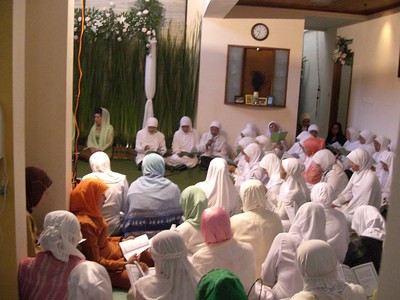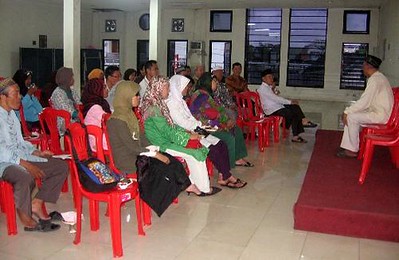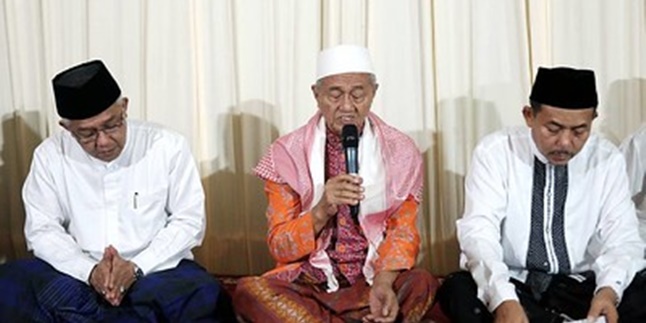Kapanlagi.com - In the religion of Islam, there are several terms that come from the Arabic language, one of which is the word tabligh. In daily life, tabligh is often used to refer to a gathering or religious event. Usually, for a large number of participants, the religious event is often called tabligh akbar. In general, the meaning of tabligh is conveying or inviting goodness.
Based on the meaning of the word, the word tabligh is already used correctly by the community. Tabligh is a popular term, not only among Muslims, but also among non-Muslims who have probably heard it before, although they may not understand its meaning. However, there may also be Muslims who still do not understand the meaning of tabligh.
So, to better understand what tabligh is, here is an explanation that tabligh is a way of conveying or inviting goodness in Islam, compiled from various sources.
1. Definition of Tabligh

Definition of tabligh (credit: flickr)
In Arabic, the word tabligh comes from the word ballagha-yuballighu-tablighan, which means to convey. More specifically, tabligh is now understood as an activity of conveying the teachings of goodness in Islam contained in the Quran and Hadith. In addition, various acts of goodness towards fellow believers can also be conveyed through tabligh.
Often, tabligh is also interpreted as an invitation to do good deeds. In practice, tabligh is communicative and argumentative. Therefore, tabligh is often conveyed in the form of religious lectures or assembly gatherings. For example, lectures in mosques or commemorations of important days such as Eid, Isra and Mi'raj, and so on.
2. Tabligh during the time of Prophet Muhammad
Tabligh is not actually a new activity. Tabligh has existed since the time of Prophet Muhammad. The first time Prophet Muhammad carried out tabligh was when he invited his companions to become the group of as-Sabiqunal Awwalun or the first people to embrace Islam.
As an example to follow, it is only natural for every Muslim to emulate the behavior of Prophet Muhammad, including in conducting tabligh. In fact, conveying goodness is highly encouraged for Muslims. This is as Prophet Muhammad stated in the following hadith:
"Convey (tabligh) from me even if it is just one verse," Hadith narrated by Imam Bukhari, Tirmidzi, and Imam Ahmad from Ibn Amr.
However, it should be understood that there is a difference between tabligh and the sermon (khutbah) usually delivered during Friday prayers or Eid prayers. As we know, there are certain requirements that must be fulfilled for a sermon to be valid. This is different from tabligh, which does not have such rules.
Tabligh is considered more flexible as it can be done anytime and anywhere. There are also no specific rules or procedures. However, of course, tabligh must be carried out in a proper and noble manner.
3. The Purpose of Tabligh

The Purpose of Tabligh (credit: flickr)
Based on the explanation and brief review of the prophetic era tabligh above, it is clear that the purpose of a tabligh activity is to realize the teachings of Islam in daily life. This is done by inviting Muslims to practice goodness as stated in the Quran and hadiths.
Performing tabligh is also believed to bring benefits to one's social life. Additionally, tabligh is believed to bring peace and tranquility to one's life. On the other hand, conveying and participating in tabligh will strengthen the faith of a Muslim.
4. Principles in Tabligh
Tabligh is one of the noble deeds that will be rewarded with goodness. However, it should be noted that tabligh cannot be done haphazardly. There are several things to consider when carrying out tabligh. One of them is to avoid forcing non-Muslims to believe or even convert to Islam. This is stated in the following verse of the Quran.
"Indeed, you cannot guide whom you like, but Allah guides whom He wills. And He is most knowing of the [rightly] guided." (Surah Al-Qasas, verse 56).
In this verse, Allah SWT explains that His guidance will come to anyone He wills. This means that there is no need to force others to believe in tabligh.
5. Main Activities in Tabligh

Activities in tabligh (credit: flickr)
So far, we have understood that tabligh means religious study or assembly. In tabligh, there are main activities. For example, in religious study or assembly, a religious leader or expert is usually invited to convey their religious knowledge. In terms of terminology, the person who conveys the teachings of goodness in tabligh is called a mubaligh (for males) and mubalighah (for females).
In a tabligh event, mubaligh and mubalighah will convey teachings of goodness through an explanation similar to a speech or lecture. In order for the message in the speech or lecture to reach the listeners, a mubaligh and mubalighah must also have excellent rhetorical skills.
In addition to the delivery method, mubaligh and mubalighah must also pay attention to the content they convey. Although relatively more flexible compared to Friday sermons or holiday sermons, tabligh must still be carried out carefully. The content of tabligh must be based on the goal of promoting good deeds and avoiding wrongdoing.
That is the explanation about tabligh as an activity of conveying and promoting goodness in Islam. Hopefully, it is beneficial and can increase knowledge.
(kpl/psp)
Disclaimer: This translation from Bahasa Indonesia to English has been generated by Artificial Intelligence.















